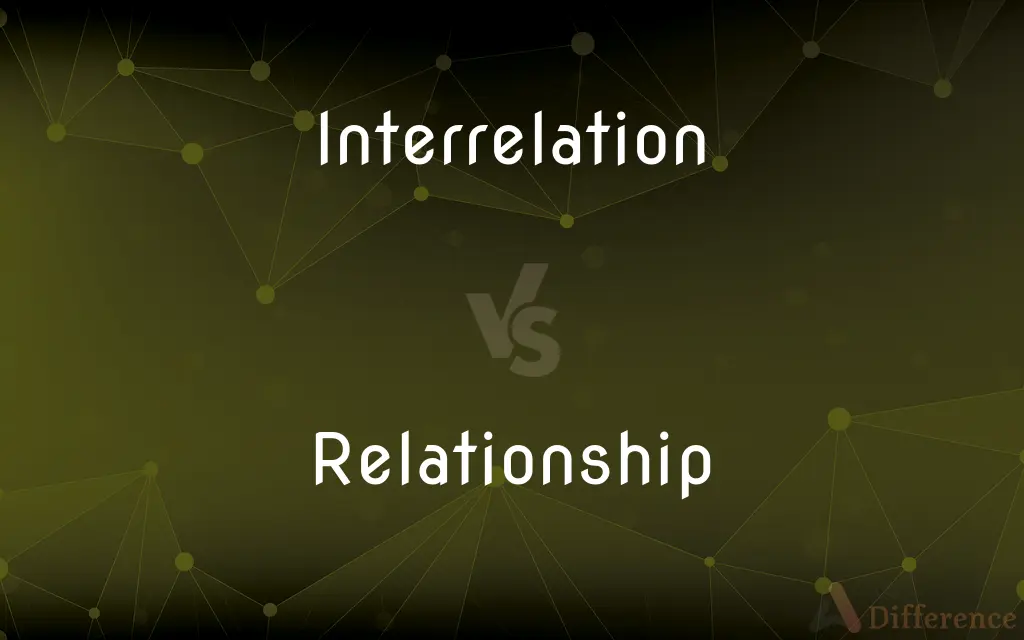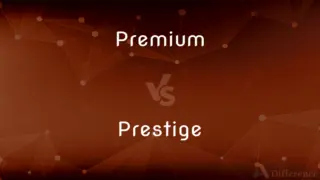Interrelation vs. Relationship — What's the Difference?
Edited by Tayyaba Rehman — By Fiza Rafique — Updated on March 28, 2024
Interrelation refers to the mutual or reciprocal relation between two or more entities, emphasizing their interconnectedness, while relationship denotes a connection or association between entities, broader in scope and context.

Difference Between Interrelation and Relationship
Table of Contents
ADVERTISEMENT
Key Differences
Interrelation specifically highlights the mutual influences or dependencies between entities, suggesting a more complex and often dynamic connection. It is commonly used in contexts where the emphasis is on the interconnectedness and reciprocal effects of entities on each other. On the other hand, a relationship refers to a broader concept of connection or association that can range from causal links to personal bonds, not necessarily implying mutual or reciprocal influence.
While interrelations are often discussed in the context of systems, theories, or concepts, illustrating how parts of a system affect each other, relationships can be personal, theoretical, or spatial, among others, and do not require the elements to be interdependent or reciprocal. This distinction underlines the specificity of interrelations in addressing the interconnectedness of entities, whereas relationships can describe a wide array of connections without the need for reciprocity.
The term "interrelation" is frequently used in academic and professional disciplines such as sociology, psychology, and ecology to analyze and describe the complex web of connections that influence outcomes within systems. Relationships, while also relevant in these fields, are used more broadly across various contexts, including romantic, familial, and professional arenas, highlighting the versatility of the term.
Understanding the interrelation between components of a system can provide deep insights into how changes in one element can affect others, critical for fields like ecology, economics, and organizational behavior. Conversely, understanding the nature of relationships between entities is crucial across all aspects of life, from personal development to professional collaborations, indicating the fundamental importance of both concepts.
Despite their differences, both interrelation and relationship play crucial roles in understanding the complexity of connections and associations between entities. Whether emphasizing the dynamic and reciprocal nature of interrelations or the broader, more general connections denoted by relationships, both concepts are vital in dissecting and comprehending the intricacies of interactions within and between systems.
ADVERTISEMENT
Comparison Chart
Definition
Mutual or reciprocal relations between entities
Connection or association between entities
Emphasis
Interconnectedness and reciprocal effects
Broad connections, not necessarily mutual or reciprocal
Contexts
Often used in complex systems and theoretical discussions
Wide-ranging, including personal, theoretical, and spatial
Implication
Implies a dynamic and complex connection
Can imply a variety of connections without dynamic reciprocity
Fields
Sociology, psychology, ecology
Universal across various contexts
Compare with Definitions
Interrelation
Emphasizes mutual or reciprocal connections between entities.
The interrelation between bee populations and flowering plants is crucial for the ecosystem.
Relationship
Does not necessarily imply reciprocity or mutual influence.
The historical relationship between two countries can shape current diplomacy.
Interrelation
Often used to describe complex systems or theories.
Researchers study the interrelation of social behaviors and cultural evolution.
Relationship
Encompasses a wide range of connections, from personal to spatial.
The novel explores the complex relationship between siblings.
Interrelation
Common in sociology, ecology, and psychology.
In ecology, the interrelation of species determines community structure.
Relationship
Describes a connection or association, broad in nature.
The relationship between exercise and mental health is well-documented.
Interrelation
Suggests a dynamic and interconnected influence among entities.
The study highlights the interrelation between economic policies and public health.
Relationship
Relevant in both personal and professional spheres.
Building strong relationships with clients is key to business success.
Interrelation
Critical in understanding how changes in one part affect the whole.
Urban planners consider the interrelation of transportation systems and city development.
Relationship
Universal, applicable across various contexts.
In architecture, the relationship between space and function is fundamental.
Interrelation
Mutual or reciprocal relation; correlation; interrelationship
Relationship
The condition or fact of being related; connection or association.
Interrelation
Mutual or reciprocal relation; correlation.
Relationship
A particular type of connection existing between people related to or having dealings with each other
Has a close relationship with his siblings.
Interrelation
Mutual or reciprocal relation or relatedness;
Interrelationships of animal structure and function
Relationship
Connection or association; the condition of being related.
Relationship
(mathematics) The links between the x-values and y-values of ordered pairs of numbers especially coordinates.
Relationship
A way in which two or more people behave and are involved with each other
I have a good working relationship with my boss.
Relationship
(music) The level or degree of affinity between keys, chords and tones.
Relationship
The state of being related by kindred, affinity, or other alliance.
Relationship
A relation between people; (`relationship' is often used where `relation' would serve, as in `the relationship between inflation and unemployment', but the preferred usage of `relationship' is for human relations or states of relatedness);
The relationship between mothers and their children
Relationship
A state of connectedness between people (especially an emotional connection);
He didn't want his wife to know of the relationship
Relationship
A state involving mutual dealings between people or parties or countries
Common Curiosities
What defines an interrelation?
An interrelation is defined by mutual or reciprocal relations between entities, emphasizing their interconnectedness.
Can a relationship be considered an interrelation?
Yes, if the relationship involves mutual or reciprocal influences, it can be considered an interrelation.
Why is understanding interrelations important in ecology?
It's crucial for understanding how species interact within ecosystems, affecting biodiversity and stability.
What types of relationships are there?
Relationships can be personal, professional, causal, spatial, among others.
Is every connection between entities a relationship?
Yes, any form of connection or association can be considered a relationship.
Can interrelations change over time?
Yes, as the dynamics within a system evolve, so too can the interrelations between its components.
How do psychologists study interrelations?
Psychologists study interrelations to understand the influences of various factors on human behavior.
Are all family dynamics considered interrelations?
Yes, if they involve mutual influences and dependencies.
How do interrelations affect business organizations?
Understanding interrelations can help in strategic planning and improving organizational efficiency.
How is a relationship different from an interrelation?
A relationship refers to a broader connection or association, not necessarily implying mutual or reciprocal influence.
Why might the distinction between interrelation and relationship matter?
The distinction clarifies the nature of the connection, which can impact analysis and decision-making.
What role does reciprocity play in interrelations?
Reciprocity is a key aspect, highlighting the mutual influence and dependency among entities.
How do relationships evolve?
Relationships evolve based on changes in understanding, behavior, and external circumstances influencing the entities involved.
How are interrelations modeled in systems theory?
Systems theory models interrelations to represent the complex interactions and dependencies within a system.
Can the study of relationships benefit personal development?
Yes, understanding relationships can improve communication, empathy, and interpersonal skills.
Share Your Discovery

Previous Comparison
Premium vs. Prestige
Next Comparison
Flesh vs. FreshAuthor Spotlight
Written by
Fiza RafiqueFiza Rafique is a skilled content writer at AskDifference.com, where she meticulously refines and enhances written pieces. Drawing from her vast editorial expertise, Fiza ensures clarity, accuracy, and precision in every article. Passionate about language, she continually seeks to elevate the quality of content for readers worldwide.
Edited by
Tayyaba RehmanTayyaba Rehman is a distinguished writer, currently serving as a primary contributor to askdifference.com. As a researcher in semantics and etymology, Tayyaba's passion for the complexity of languages and their distinctions has found a perfect home on the platform. Tayyaba delves into the intricacies of language, distinguishing between commonly confused words and phrases, thereby providing clarity for readers worldwide.














































